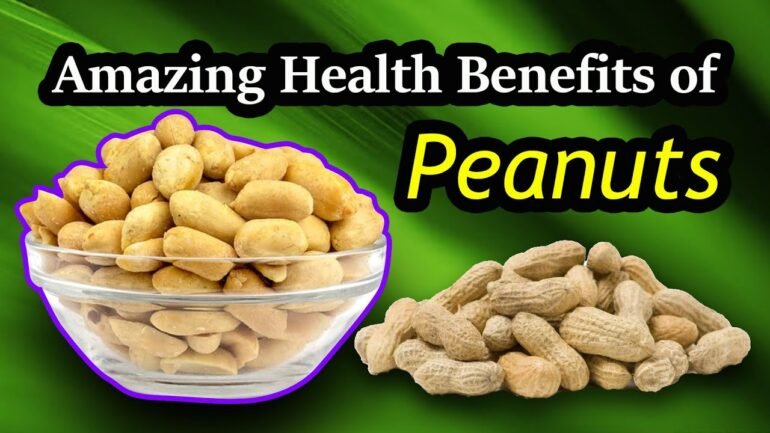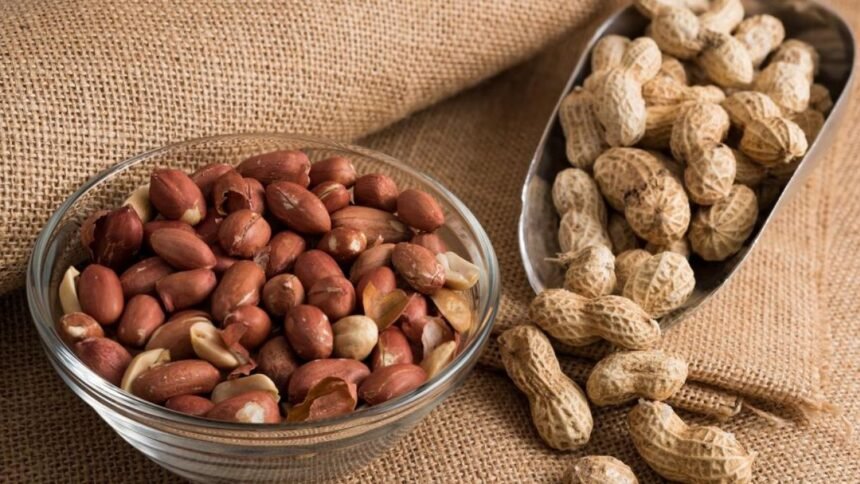Origin and Production
Originating in South America, peanuts were initially grown there more than 7,000 years ago. China, India, Nigeria, and the United States are now important producers. They are harvested in warm regions and, unlike most nuts, grow underground.
Peanuts' Nutritious Value
A 100g portion of peanuts offers roughly:
- Approximately 567 kcal
- 25g of protein (a great source of plant-based protein)
- 49g of fat, primarily healthy monounsaturated and polyunsaturated fats
- 16g of carbohydrates
- 9g of fiber
- Vitamins: Biotin, Folate, Niacin (B3), and Vitamin E
- Minerals: copper, iron, zinc, potassium, phosphorus, and magnesium
Peanuts' Health Advantages


Heart condition
Due to their high unsaturated fat content, walnuts and almonds have received a lot of attention as “heart-healthy” foods. However, studies indicate that peanuts are just as beneficial to heart health as more costly nuts. Along with fiber and plant sterols, peanuts are a significant source of monounsaturated and polyunsaturated fatty acids. These beneficial elements lower blood pressure and harmful LDL cholesterol, which lowers the risk of heart disease. Additionally, they aid in preventing blood clots that could result in a stroke or heart attack. Additionally, peanuts lower inflammation, which has been connected to heart disease.
Loss of weight
Protein-rich foods might make you feel full on less calories. In terms of protein content, peanuts rank second only to almonds among nuts. According to studies, eating a moderate amount of peanuts does not make you gain weight. Peanuts may actually aid in weight loss.
Greater longevity
Consuming peanuts may also extend your life. Peanuts contain all 20 of the essential amino acids plus the antioxidant coenzyme Q10, which your cells need to grow and remain healthy. According to experts, these substances prolong life and help prevent illness. Peanuts’ content of these beneficial compounds is further increased by roasting or boiling them.
Cut down on inflammation
Conditions include heart disease, type 2 diabetes, and several forms of cancer are influenced by inflammation. Peanuts are rich in fiber, unsaturated fat, antioxidants, and other compounds that lower inflammation all over your body. Research indicates that individuals who consume peanuts and peanut butter exhibit reduced levels of inflammatory markers, including interleukin-6 and C-reactive protein.
Preventing cancer
Nuts may help prevent cancer because of their high antioxidant content and phytochemicals, which are plant compounds with health benefits. One of the plant molecules found in peanuts, resveratrol, may help prevent several forms of cancer. Eating peanuts and peanut butter may help reduce the incidence of gastric noncardia adenocarcinoma, a kind of stomach cancer, in older adults.
Health of the gallbladder
Consuming more peanuts may also help shield your gallbladder, which produces and secretes bile, a digesting fluid. According to one study, women who regularly ate peanuts had a lower risk of requiring gallbladder surgery—a procedure used to cure gallstones—than those who did not. Additionally, studies suggest that males who frequently eat peanuts may be less likely to develop gallstones.
Uses of Peanuts in Cooking
Peanuts can be utilized in a wide variety of ways.
- Roasted, salted, or spiced snacks.
- Peanut butter: A common, high-protein spread.
- Confectionery: Found in cakes, brittles, laddoos, and chocolates.
- Cooking Oil: A common cooking and frying oil is peanut oil.
- Savory Dishes: Added to salads, stir-fries, chutneys, and curries.
- Trail Mixes: Concocted as energy snacks with raisins and other dry fruits.
Conclusion
More than simply an inexpensive snack, peanuts are a nutrient-dense powerhouse that is high in protein, good fats, vitamins, and minerals. Frequent use promotes blood sugar regulation, weight management, brain function, and heart health. Peanuts are a simple yet effective superfood for everyday nourishment, whether you like to eat them roasted, in butter, or in a dish.


